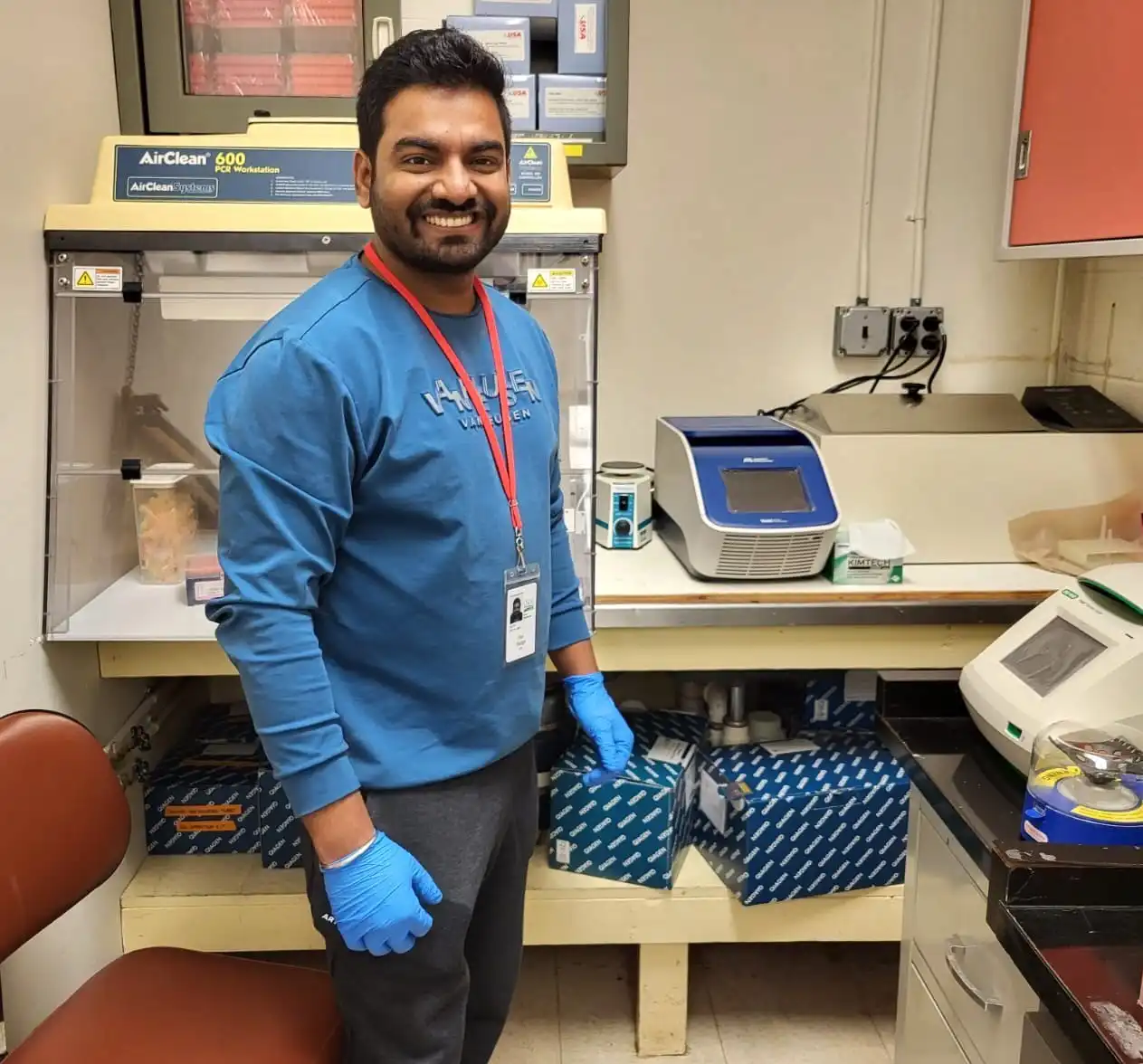USDA-ARS fellow aims to mitigate risks associated with foodborne pathogens
Meet Aditya Gupta

Aditya Gupta, Ph.D., is improving food safety by studying parasites that can infect livestock and humans.
Aditya Gupta, Ph.D., was raised in a family of six in India where he experienced the financial challenges of securing a quality education. Gupta’s parents were not able to attend school due to financial burdens, but that hardship did not stop them from encouraging him to pursue his educational goals. Gupta originally planned a career in medicine, but his plans changed in sixth grade through the encouragement of his science teacher. He was also influenced by Kary Mullis, an American biochemist and Nobel Prize winner, who played an inspirational role in the invention of the polymerase chain reaction (PCR). The PCR is a technique used in laboratories to rapidly replicate specific DNA segments using an enzyme called DNA polymerase.
Gupta earned his bachelor’s degree in biology as well as his master’s degree in zoology from Panjab University, Chandigarh. He then received his bachelor’s in education from Punjabi University, Patiala, Punjab before going on to obtain a Ph.D. in Life Sciences (Zoology) from Punjabi University as well.
"My research interests evolved as I explored parasitology, foodborne pathogens, and molecular biology, setting me on a path to becoming a scientist,” said Gupta.
ORISE has played a crucial role in my career, and I hope my story inspires others from underprivileged backgrounds to pursue STEM careers.
In the final year of his postdoctoral fellowship, Gupta started researching opportunities in the U.S. that aligned with his expertise in molecular parasitology. He discovered a fellowship with the Oak Ridge Institute for Science and Education (ORISE) where he would have the chance to study under the mentorship of leading scientists at the United States Department of Agriculture – Agricultural Research Service (USDA-ARS), but most specifically under the mentorship of world-renowned parasitologist, Dr. Jitender Prakash Dubey. He is part of the Animal Parasitic Diseases Laboratory (APDL) at the USDA-ARS in Beltsville, Maryland.
The USDA ARS Research Participation Program provides opportunities for students, postgraduates, established scientists and faculty to participate in programs, projects and activities at ARS-designated facilities to help ARS solve agricultural problems of high national priority.
“It’s a dream come true to work with one of the best scientists at the USDA-ARS. ORISE provided the perfect platform to apply my research skills to real-world challenges in food safety and public health,” Gupta said.
Gupta and his team study the identification, molecular, characterization, and genomic studies of foodborne parasites, including Sarcocystis from meat samples. He is part of a comprehensive beef survey from the grocery stores and checks the presence of foodborne pathogens in the meat. He then looks for any Sarcocystis species which are transmitted to humans.
“Using advanced sequencing and bioinformatics tools, I work to understand their transmission, genetic diversity, and potential risks to food safety.” Gupta explained. “I am also working on the genome assembly of a Sarcocystis species (Sarcocystis falcatula) which involves birds as the intermediate host.”
Gupta’s research helps to improve food safety by studying parasites that can infect livestock and humans.
“Foodborne parasites, like species of Sarcocystis, which require two hosts to complete their life cycle, can remain dormant in animal tissues for years before causing symptoms of illness,” Gupta said. “One of the basic things which we can do is to freeze the meat before cooking. Freezing meat kills parasites in the genus Sarcocystis.”
A typical day at Gupta’s appointment is full of research and collaboration with other scientists. He designs experiments, conducts pepsin digestion of beef meat samples, performs DNA extractions and phylogenetic studies and analyses bioinformatics data. He also spends a portion of his day writing manuscripts for publication in scientific journals.
He has multiple ongoing publications related to his research at USDA-ARS including papers published in Parasitology, Internal Journal for Parasitology, Parasites & Vectors, Journal of Parasitology and Veterinary Parasitology: Regional Studies and Reports.
Outside of the lab, Gupta enjoys mentoring students, contributing to educational journals, participating in science outreach programs, and engaging in fitness activities. He loves listening to ghazals, a form of Arabic poetry set to rhythmic music.
Gupta aims to continue researching molecular parasitology and infectious diseases, either in academia or a government research institution. He also hopes to lead independent research projects focused on foodborne pathogens and public health.
“My ORISE fellowship has been a transformative experience. It has provided me with unparalleled research opportunities, professional growth, and the ability to contribute to a critical field that impacts global food security,” Gupta said. “ORISE has played a crucial role in my career, and I hope my story inspires others from underprivileged backgrounds to pursue STEM careers.”
The USDA ARS Research Participation Program is funded by USDA and is administered through the U.S. Department of Energy’s (DOE) Oak Ridge Institute for Science and Education (ORISE). ORISE is managed for DOE by ORAU.

